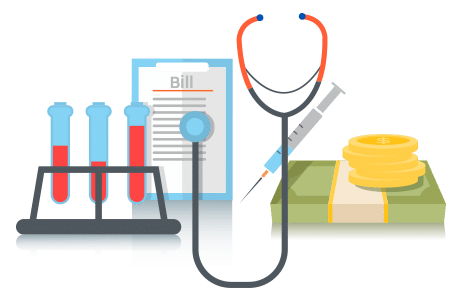Help With Medical Bills
It is challenging enough to have to cope with an unexpected illness or accident that forces an individual into the emergency room and/or an extended hospital visit that necessitates follow-up visits with doctors and other medical professionals. However, even for those with some form of health insurance, the financial burdens associated with getting sick can escalate rapidly and quickly compound the misery associated with illness and poor health.
In fact, more than half of the debt that appears on American consumer credit reports can be categorized as medical debt, and unfortunately, it remains one of the primary causes of consumer bankruptcy in the United States today. Given the gravity of the situation, it is important for anyone who is facing onerous medical debt to calmly think matters through and take available steps to help mitigate the medical debt burden. Let’s take a closer look at what can be done to help lessen the burden associated with unexpected medical bills.

Examine Your Medical Bills Closely
The first step toward getting help paying medical bills is to make certain that all charges are accurate. Medical billing is complex, and mistakes are commonly made. Examine all bills closely for any possible overcharges or billings for services that were not actually rendered. Ask for an itemized statement and scrutinize it closely for any double-billing or unexpected hospital fees.
Follow up with your insurance company regarding charges that were not covered and get clear explanations as to why you are being held financially responsible. Compare your itemized statement with all explanation of benefits forms from your insurance company and make certain that everything that should have been covered was, in fact, covered.
ABC
Contact Your Medical Provider
For those charges not covered, you can attempt to negotiate and work out a payment plan with your doctor or hospital. Contacting your medical provider when you are not immediately paying your bill off in full is a good idea, as this informs the billing office that you are not ignoring the debt. This is important because medical providers typically only attempt to collect on bills for a few months before turning over delinquent accounts to collection agencies and tarnishing the individual’s credit score and profile.
However, the three major credit bureaus – Experian, Equifax and TransUnion now utilize a 180-day waiting period before including medical debt on credit reports in order to allow for sufficient time to resolve disputes with insurance companies and payment delays.
Pursue Help With Medical Bills
If paying your medical bills represents a true financial hardship based on a limited income level, file an appeal with the hospital for a rate cut. Assemble all of your bills in an organized manner while providing income tax returns and/or W-2s that demonstrate your financial hardship. Many non-profit hospitals are required to provide financial assistance to qualified low-income patients, and in some instances, the entire liability can be excused.
Additionally, some for-profit hospitals offer similar programs or other forms of financial assistance that operate on a sliding scale, so it is important to inquire about rate reductions at the hospital that treated you. Regardless, when dealing with hospital bills, contact the billing office and have every charge fully explained to you.


More Ways to Get Help Paying Medical Bills
When faced with a high debt load of medical bills, it is important not to ignore them. Hospitals and other medical facilities will turn over delinquent accounts to outside collection agencies who then ultimately report the debt to the three major credit bureaus. This can make things more stressful while blemishing your credit profile.
However, you can use the 180-day waiting period to carefully dispute questionable charges with medical providers and your insurance company. Remember – no detail on a hospital bill is too small – be fully thorough in your questioning, as this is the best way to guard against any potential billing errors and fraud. Meantime, it can also make sense to consult benefits.gov and complete the lengthy online questionnaire to find out what health care benefits can be applied for, including Medicaid.
Are you in debt? we can help
Get Debt Relief
Speak with licensed debt specialists dedicated to guiding you toward financial stability every step of the way.

Ready To Get Started?
See if you qualify for debt relief. Get a Free savings estimate to see how quickly you can be debt free.
Embrace financial freedom with our tailored solutions, expert guidance, and unwavering commitment to your success.
Experienced Professionals
Our experienced team has helped thousands of clients successfully eliminate debt and regain financial freedom.
Customized Solutions
We know every financial situation is different, so we design personalized debt relief plans to fit your specific needs and goals.
High Success Rate
Our proven debt relief strategies deliver real results. With a strong track record of success, we help clients achieve lasting financial stability.
Confidential Consultation
Your privacy is our priority. All debt relief consultations are 100% confidential and handled with the highest level of discretion.
Explore other blogs











